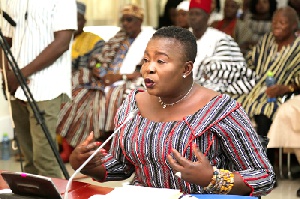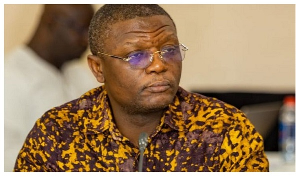The Upper East Regional Minister, Madam Paulina Patience Abayage, has said government is determined to reduce corruption to the barest minimum by harnessing and evoking every available policy guide to achieve results.
She said even though corruption and its related issues had been assumed to be perceived, there was urgency in the need to ensure that the apex of the phenomenon was crushed by adopting multifaceted approaches and inviting key actors to sensitise and sanitise the system.
Madam Abayage said this in an address read on her behalf at an engagement meeting of community of traditional authorities, duty bearers, media, Civil Society Organisations (CSO), Volunteer groups, Persons With Disabilities (PWDs) and selected heads of departments on findings of a community satisfaction survey on some selected government social intervention programmes undertaken by the Citizens Empowerment Against Corruption (CEMAC).
The CEMAC is a consortium of CSOs comprising RISE Ghana, the Presbyterian Health Services-North (PHS-North), the Ghana Journalists Association (GJA) and the Association of Church Development Projects (ACDEP), which is the lead organisation executing the Anti-Corruption Project and funded by Star Ghana Foundation and its allies including; the European Union (EU), the United Kingdom- Aid (UKAid), and the Danish International Development Agency (DANIDA).
The project is designed and tailored to monitor four key government intervention areas, including; Livelihood Empowerment Against Poverty (LEAP), Free Maternal Healthcare, fertilizer subsidy; under the Planting for Food and Jobs (PFJ), and the National Health Insurance Scheme (NHIS).
The Minister indicated that the recent passing of the Right to Information Bill into law by Parliament, the creation of the Office of the Special Prosecutor, the Anti-Graft Institution, resources and logistics made available to institutions charged to confront corruption and related issues in the country, such as the Auditor General’s Department, were amplifiable examples of efforts by government to respond to corruption in the country.
Madam Abayage invited more CSOs and the media to extend their watchdog roles in ensuring that people who engaged in corruption and related practices were uncovered.
She commended CEMAC for the survey and said the findings from the survey would be relevant to the Regional Coordinating Council (RCC) and other stakeholders because “it will inform us as to which appropriate measures to put in place to ensure that our clients and the good people of this region receive satisfactory services from social intervention programmes, and guide us in the proper implementation of these interventions”.
The Minister invited members of the public to play positive watchdog roles in the response against corruption and said “corruption does not occur in the vacuum, for there is always an initiator and a beneficiary, a giver and a receiver as in the case of bribery.
Madam Abayage called on CEMAC and other CSOs to sensitise members of the public to appreciate the need to protect society against corruption. Mr Norbert Apentibadek, Coordinator of CEMAC who gave a brief background to the project said the four organisations put a proposal together to access a sponsorship funding from Star Ghana Foundation to carry out the anti-corruption programme.
He explained that activities under the project were geared towards sensitisation of community members to appreciate the impact of corruption and arm them to resist and confront the canker holistically in Bongo, Talensi and the Kassena-Nankan West Districts.
Mr Samuel Ayeh, Monitoring and Evaluation Officer at the Development Associates, the consultancy firm engaged to conduct the community satisfaction survey, observed that there was late disbursement of funds, low public education, and too much political interference and issues of wrong beneficiaries under the LEAP programme.
He the study, he said revealed that 33 percent of women had access to fertilizer subsidy under the Planting for Food and Jobs programme in 2018 and recommended that more women be given the opportunity to access fertilizers through a quota system as there were more women engaged in farming. “Again, we recommend a relook at the of pass books system to give more access to farmers”.
Mr Ayeh noted that whereas pre and post natal attendance were encouraging at health facilities, the study revealed that deliveries at health facilities were low and advised management of the Ghana Health Service to team up with traditional birth attendants to encourage more pregnant women to deliver at health facilities.
General News of Saturday, 30 March 2019
Source: ghananewsagency.org

















